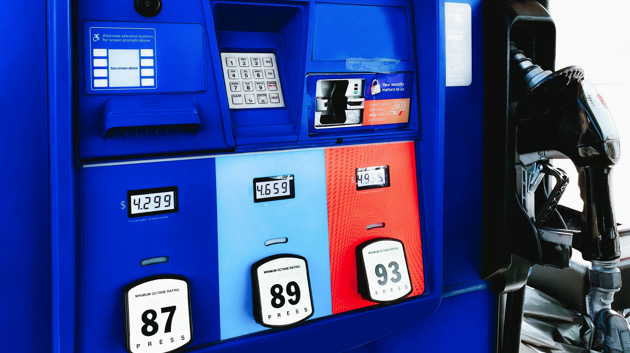
(NEW YORK) -- Gas prices nationwide have plunged to their lowest level since February as demand has dropped from peak summer travel season and the price of crude oil has fallen.
Softening pain at the pump offers welcome relief for households battered by inflation that stands near a 40-year high.
The national average price for a gallon of gas, which stands at $3.47, has fallen more than 30% since it reached a peak of $5.01 in mid-June, according to data AAA provided to ABC News.
Over the last month alone, the price for a gallon of gas has fallen nearly 8%.
In California, the state with the highest average price, a gallon of gas costs $4.90, though that price has fallen more than 11% over the past month. In Texas, the state with the lowest average gas price, a gallon costs $2.84, AAA data showed.
Despite the recent price dip, the cost of gas remains elevated -- roughly 3% above a $3.38 national average one year ago, according to AAA data.
The decline in gas costs owes in part to a fall-off in demand as weather has cooled and Americans have dialed back travel, industry analysts told ABC News.
"In North America, there is a summer driving season when demand is particularly high and refineries are running all out," Pavel Molchanov, a senior energy analyst at Raymond James, told ABC News. "In the fall and winter, demand cools off."
In addition to a drop in demand, gas prices have benefited from a decline in the cost of crude oil, allowing refineries to generate fuel at lower prices.
The cost of a barrel of oil, which stands at about $83, has plummeted nearly 8% over the last month.
The fall in oil prices -- which are set on a global market -- has stemmed from discussions at the European Union on a plan to place a price cap on Russian oil, analysts said.
The compromise measure would limit the oil revenue enjoyed by Russia as it wages war against Ukraine, but would also allow for the continued purchase of Russian oil, boosting global supply and pushing down prices.
The price of oil has also been pushed downward in recent months by the Biden administration's release of petroleum from the strategic reserve as well as a decline in demand in China due to continued COVID lockdowns, the analysts said.
"The big wild card is China, which seems to change day to day," Peter McNally, a global sector leader for industrial materials and energy at Third Bridge, told ABC News.
In recent days, the price of oil has inched upward amid civil unrest in China and the possibility of a relaxation of the lockdown policy, threatening to reverse the decline in U.S. gas prices, Molchanov said.
"If the Chinese government signals COVID lockdown easing in response to popular protest, then that stimulates among other things oil demand in China and it boosts oil prices," he said.
"So when oil prices go up, you will see that reflected in gas at the pump," he added.